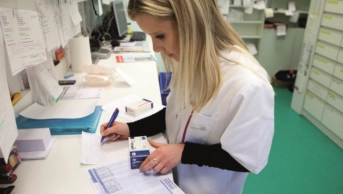
Shutterstock.com
The number of pharmacists working in the Scottish pharmacotherapy service has risen by 22% over the past five years, according to data published by the Scottish government.
In the latest ‘Primary care improvement plans — implementation progress summary‘, published on 17 June 2025, the Scottish government revealed that as of March 2025, there were 662 whole-time equivalent (WTE) pharmacists working in the service, compared with 543 WTE pharmacists in March 2021.
The implementation progress summary said that the number of pharmacy technicians working in the pharmacotherapy service has also risen by almost 90% over the same period.
As of March 2025, there were 471 WTE pharmacy technician roles — up from 248 WTE pharmacy technician roles in 2021, which is a 90% increase, the document said.
According to the latest update, between 84% and 98% of GP practices in Scotland now have access to some level 1 pharmacotherapy subservices.
It also showed that 98% of practices handle discharge letters and requests; 89% can do acute prescribing requests and 84% are able to do repeat prescribing requests.
At more advanced levels of the service, 94% of practices offer level 2 medication reviews, and 82% provide level 3 polypharmacy reviews or specialist clinics, the data revealed.
Level 1 is considered the ‘core’ of the pharmacotherapy service, with levels 2 and 3 considered advanced and/or additional.
The pharmacotherapy service was introduced as part of the 2018 General Medical Service (GMS) contract and clarified in a memorandum of understanding (MoU) issued in 2021.
The MoU said: “Managing acute and repeat prescriptions, medicines reconciliation, and the use of serial prescribing (which form a substantive part of the level one service described in the GP contract offer) should be delivered principally by pharmacy technicians, pharmacy support workers, managerial, and administrative staff.
“In tandem, focus on high-risk medicines and high risk patients, working with patients and using regular medication and polypharmacy reviews to ensure effective person-centred care are being delivered principally by pharmacists (the levels two and three described in the contract offer),” the MoU added.
The 2025 update is the first to include reporting on how the Primary Care Improvement Fund (PCIF) — which was allocated to support implementation of the services in the GMS contract — was spent.
Pharmacotherapy accounted for the largest share of staff costs from the PCIF in 2024/2025, with £64.2m spent out of a total of £185m, it added.
Jenni Minto, Scottish public health minister, said: “We have made significant progress in the expansion of primary care multidisciplinary teams, with over 5,000 WTE staff in post at March 2025, an increase of over 170 WTE since [2024].
“These teams are helping to ensure people receive the right care, at the right time in general practices and the community and were supported by over £190m in the primary care improvement fund last year, as well as additional investment through the primary care phased investment programme.”
Laura Wilson, director for Scotland at the Royal Pharmaceutical Society, said: “It is encouraging to see high, and still increasing, access to all levels of the pharmacotherapy service. This shows that the current model is working. Models such as this take time to establish and it is reassuring to see the increase in pharmacists working in the service since 2021.
“This means that even more patients are getting access to clinical knowledge to help them make the most of their medicines, which is exactly why the service was designed.
“We remain extremely keen that work is continued to ensure that the skills mix across pharmacotherapy services are right. The core (level 1) service requires a skill mix which is still to be established in some areas, and we want to ensure the skill mix is there to allow a greater number of pharmacists to be working at level 3.”
“It is important that pharmacists in the pharmacotherapy service are working at the right level, to ensure patients can benefit from pharmacists’ skills, knowledge and experience to truly optimise their medicines and achieve the best outcomes,” she added.


